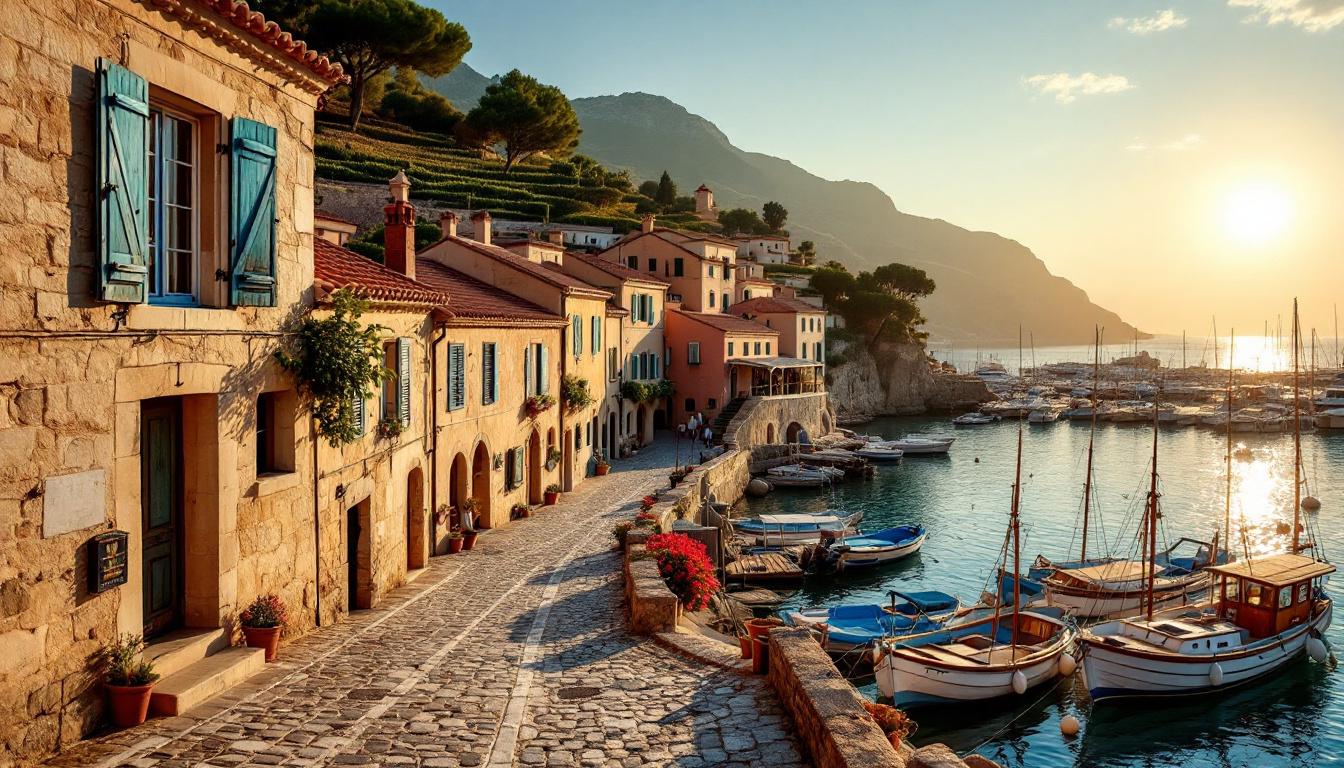Walking through Banyuls-sur-Mer feels like stepping into a time machine. This Catalan-French village nestled between the Pyrenees and Mediterranean represents exactly what the glamorous Côte d’Azur looked like 50 years ago, before cruise ships and Instagram crowds transformed the French Riviera into a commercialized playground.
With just 4,583 residents protecting their wine-making heritage, Banyuls offers the authentic Mediterranean experience that places like Nice and Cannes lost decades ago. Here, morning fish markets still operate from wooden boats, family-run wine cellars welcome visitors for intimate tastings, and evening promenades unfold along quiet harbors where locals outnumber tourists 10 to 1.
The locals aren’t just preserving their village by accident. They’re actively protecting the last authentic Mediterranean wine culture from the mass tourism that destroyed their famous neighbors to the east.
The harbor life that vanished from the Riviera
Morning fishing rituals unchanged since 1970
Every dawn, traditional fishing boats called *barques catalanes* return to Banyuls harbor with their catch, exactly as they did when the Côte d’Azur still had working harbors. Fishermen sort their nets on wooden docks while wives prepare for the morning market, a scene that disappeared from Nice and Cannes when luxury marinas replaced working ports.
Authentic café culture without tourist menus
Harbor-side bistros serve Catalan specialties like *anchoïade* and fresh sea urchins to locals who’ve occupied the same tables for decades. Unlike the Riviera’s €25 tourist salads, lunch here costs €12 and includes wine from vineyards visible from your table. Conversations flow in rapid Catalan between generations who’ve never left.
The wine terroir that defines authentic France
Family cellars operating since before tourism existed
Banyuls produces France’s only coastal mountain wine, with vineyards cascading down terraced slopes to meet the sea. Five-generation families like Domaine de la Rectorie offer tastings in medieval stone cellars where barrels age naturally without air conditioning or corporate marketing. This intimate wine experience disappeared from Provence when bus tours arrived.
The protected appellation locals guard fiercely
The Banyuls AOC designation restricts production to traditional methods using indigenous grape varieties. Local vintners deliberately limit output to maintain quality, rejecting the industrial expansion that transformed other French wine regions into tourist factories. Only 25 producers exist, each protecting centuries-old techniques.
Architecture frozen in Mediterranean time
Fishermen’s quarters untouched by development
Narrow cobblestone streets wind between 19th-century stone houses with original terracotta roofs and wooden shutters painted in faded blues and greens. No high-rise hotels interrupt the skyline, no chain stores replace family businesses, and no tourist shops sell mass-produced souvenirs. The village looks exactly as it did in 1970s postcards.
Coastal paths reserved for locals and respectful visitors
The GR10 hiking trail connects hidden coves and vineyard paths used by smugglers for centuries. These routes remain unmarked and unguided, requiring local knowledge to discover secluded beaches where Mediterranean pines meet crystal waters. Mass tourism never found these spots because they require effort to reach.
The protection that preserves paradise
Community resistance to hotel chains and cruise ports
Banyuls residents intentionally rejected the development money that transformed the Côte d’Azur. No international hotel chains exist here, no cruise ships dock at the harbor, and no tour buses clog the village streets. Local accommodation means family guesthouses where owners share wine and stories rather than corporate hospitality.
Sustainable tourism that benefits locals first
Village festivals celebrate Catalan heritage and wine harvests rather than attracting mass crowds. The annual *Fête des Vendanges* invites visitors to participate in traditional grape picking, but limits numbers to preserve authenticity. Tourism revenue supports local families rather than international corporations.
Visiting Banyuls-sur-Mer costs 70% less than equivalent Riviera experiences while offering infinitely more authentic cultural immersion. Stay in family-run accommodations for €80 per night, taste exceptional wines directly from producers, and experience the Mediterranean exactly as it existed before mass tourism changed everything forever.
This village represents the last chance to experience authentic Côte d’Azur culture before it disappears completely. The Corsican village locals don’t want tourists to discover offers similar protection of Mediterranean authenticity, while this medieval French village split in two hides Provence’s best-kept secret showcases comparable cultural preservation. For culinary authenticity, explore this forgotten French village that grows Europe’s tastiest vegetables just minutes from Mediterranean beaches.
Planning your authentic Mediterranean escape
When should I visit Banyuls-sur-Mer for the most authentic experience?
September through October offers perfect weather, wine harvest participation, and minimal crowds. Spring months provide wildflower hiking and comfortable temperatures for exploring vineyards.
How do I reach Banyuls-sur-Mer without tourist crowds?
Fly into Perpignan airport (36km away) or drive from Barcelona (90 minutes). Avoid July-August when French families vacation, though crowds remain manageable compared to Riviera destinations.
What makes Banyuls wine unique compared to other French regions?
Banyuls produces naturally sweet fortified wines using ancient solera methods in coastal mountain terroir. The combination of Mediterranean sun and mountain minerals creates flavors impossible to replicate elsewhere in France.
Can I stay in authentic local accommodations?
Family guesthouses and small hotels offer genuine hospitality with home-cooked meals and local wine. Book directly with owners to support the community and receive insider recommendations for hidden beaches and vineyard visits.
How does Banyuls compare to other “authentic” Mediterranean destinations?
Unlike commercialized alternatives, Banyuls maintains working vineyards, active fishing, and Catalan cultural practices. Locals genuinely welcome respectful visitors while protecting their heritage from mass tourism development.
